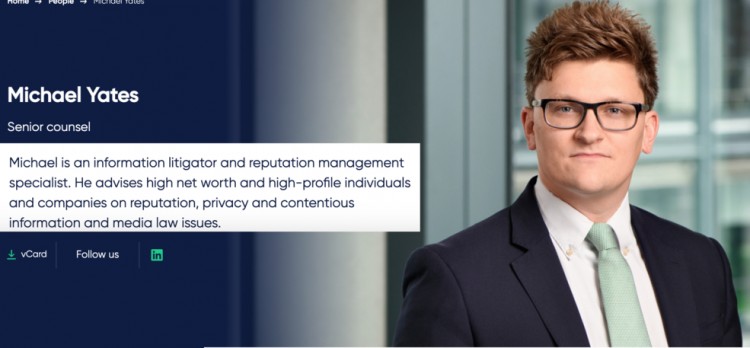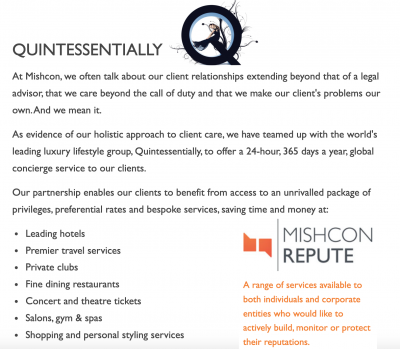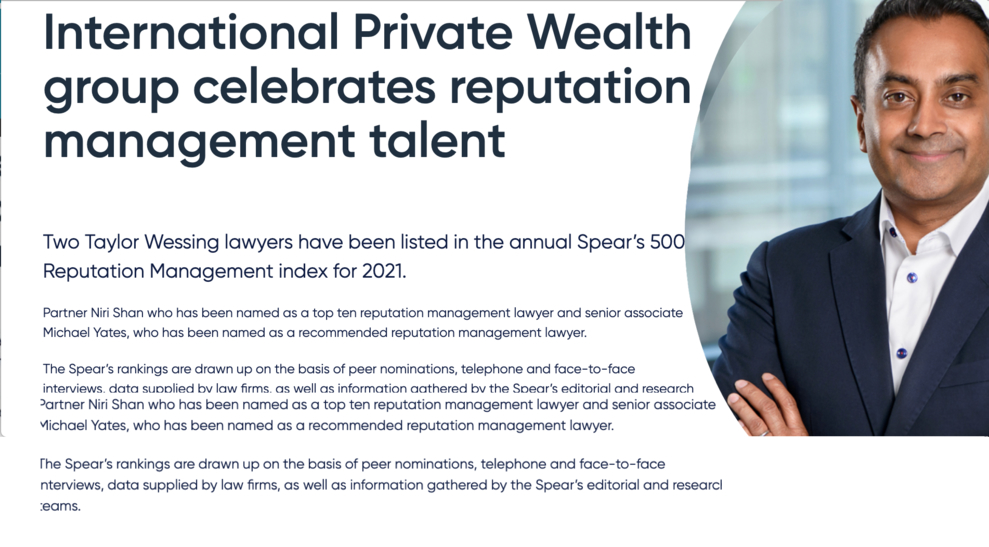Back in February, the ‘International Private Wealth Group’ division of the London office of the major US law firm Taylor Wessing proudly released an announcement praising the achievement of its ‘Reputation Management Partner’ Niri Shan and his associate Michael Yates in being named in the ‘Top Ten Reputation Management Lawyer List’ by the magazine Spears.
For those who are unaware, Spears magazine is a publication that is exclusively directed at the so-called Super-Rich. Those who cannot afford super-yachts, Swiss watches or six star holiday locations need not peruse its pages, unless to sigh over what they cannot buy. They will not be able to afford Taylor Wessing either.
As the gushing press release entitled International Private Wealth Group Celebrates Reputation Management Talent makes clear, even if advertising were allowed in the legal profession (which it strictly isn’t) this ‘award’ promoted in the pages of such a magazine would be regarded as far more valuable in targeting the clients sought by this department of the firm – which describes itself thus:
Our International Private Wealth team offers a holistic suite of legal services that cover the personal and corporate needs of the global UHNW [Ultra High Net Worth] community across the entire spectrum of their wealth from growth stage through to transition to the next generation. Visit our private wealth section for more information.
Ronald Graham, partner and Head of the Private Wealth sector group in the UK added: “Our reputation for advice in the private wealth sector is long-established and this extends to the reputation management services we offer our UHNW clients. The team routinely deal with cross border matters.. We have an outstanding track record and work quickly and effectively with clients to prevent or control damage.”
It is no coincidence that ‘Reputation Management’ comes under this Ultra High Net Worth division, since it is recognised that none but the super rich could contemplate hiring a London law firm to systematically sue/ threaten to sue journalists and the media with a view to only positive coverage being allowed.
The niche has become fantastically profitable in recent years with relative newcomers like Taylor Wessing flocking to make hay in this booming area of mainly UK based litigation, super-charged by the reach of the internet. That they are delighted with their star performers there is no doubt:
“Peers have described Niri as a ‘polished operator’” with “a unique position in the reputation management space.”
“He is especially noted for his depth of connection with the media and their lawyers, with whom he engages in a collaborative, nuanced and non-aggressive way to arrive at quiet conclusions to challenging matters that preserve clients’ relationships with the media.”
Highlighted among Shan’s achievements is “working to obtain an injunction against an anonymous blackmailer”. The law firm’s website quotes a further tribute “He gets results that no other lawyer seems able to do. And he does this time and time again. A master of quiet negotiation.’
Junior colleague Michael Yates also makes the billing and according to his bosses he is:
“An information litigator and reputation management specialist, advising high net worth and high-profile individuals on asserting their reputation and data privacy rights.
Michael is skilled at obtaining injunctive relief, stopping stories and removing content through tact rather than aggression, and has obtained many apologies, damages, takedowns and corrections for high-profile HNWs [High Net Worth Individuals].”
It is notable, however, that Mr Yates himself describes his efforts in rather more pugilistic terms. When quoted in the very same press release he refers to his ‘job space’ as a growing “battlefield”:
“I am honoured by this recognition, which I see as a testament to the challenging, yet successful, work that we do in protecting the reputation, privacy and data of high net worth individuals on the ever expanding information battlefield.”
Sarawak Report can testify to this approach. For example, writing to the editor earlier this year Yates poured screeds of self-serving argument and alleged legal precedent into a ‘Before Action Letter’ that concluded “It is obvious that our client’s right to privacy outweighs your right to publish this information” [relating to the client’s facilitating role in the laundering of $2 billion stolen from Malaysia].

Yates then threatened Sarawak Report that since he had already successfully gone after secondary publishers on the story (much larger organisations) SR was merely a last man standing on this current ‘battlefield’:
“Our client is taking steps to restore his reputation in various jurisdictions, including taking legal action in Kuwait against news publisher Al Qabas (which, we are instructed, have quoted the Sarawak Report as its sole source) and judgment in this case is expected to be handed down later this year.
You should also be aware that, after a complaint was made by our client, The Gulf News removed all of their articles about this matter referring to our client. Other publications, such as Middle East Monitor, MSN, Erem News, and Risk Screen/KYC 360, have also removed multiple articles.”
Confidential Threats
Taylor Wessing’s letters announce themselves to be “Strictly Private & Confidential’, as do all this genre of threatening demands now so regularly received by journalists. However, Sarawak Report does not consider itself bound to keep confidential a letter it did not solicit nor make any promise to keep private.
Campaigners on this issue believe that law firms should not seek to conceal their tactics by hiding behind the legal profession’s own codes of conduct nor should they expect to bully their targets into hiring expensive legal advisors in order to engage with their pre-action legal ambushes, which is what such letters invariably demand:
“Our client invites you again to comply with the take down and removal requests set out in our last letter in relation to Articles. If you will not do so, we look forward to receiving your substantive response to the legal points raised in our letter and would urge you to take legal advice.”
And again:
“To date, he [the client] has been more than reasonable, and has asked you to obtain legal advice in response to our letters. However, you have ignored this and, instead of substantively responding to the legal arguments raised, you now seek to publish more falsities”
It is well established that, more often than not, the primary purpose of such letters is to place financial pressure on journalists and publications by forcing them to engage in expensive legal action that UHNW clients can well afford to write off as a business expense.
So-called SLAPP suits rarely represent clients with a convincing case, which is largely the reason why 98% of all UK libel cases never reach the stage of judgement. The parties settle to save money, with the richest too often coming off more advantageously, whatever the rights or wrongs.
NGO campaigners for freedom of expression are concerned that SLAPP suits are an abuse designed to pressure the media to retract coverage through a game of financial attrition based on the costs of London lawyering. Throw in the indulgence of the UK’s privacy, data and copyright laws and you have a formidable toolkit in the hands of the super-rich set on silencing information about their past.
Their hand has been further strengthened in recent years by protocols (introduced in the name of the public interest) which require the mainstream media to interact extensively with those they write about or face penalties should their material prove inaccurate. Again, who but the extremely wealthy can avail themselves of such instruments through legal challenges?
By threatening journalists with such expensive duels ‘reputation lawyers’ work to undermine the basic rights of freedom of expression, free speech and the role of the media in holding the powerful and wealthy to account.
The nub of Mr Yates’ letters and all letters of this ilk was that Sarawak Report should remove all its references to the actions of their client from the internet and never mention them again, in order to avoid the cost of defending its position.
Should the material be removed, SR was assured the bullying would stop and there would be no costs to bear. In this case a raft of NGOs posted an alert against Taylor Wessing and their client on the Council of Europe’s Safety of Journalists Platform:
Since May 2021, [Sarawak Report’s editor] has received three legal letters from Taylor Wessing on behalf of [the client] in relation to five articles she published on Sarawak Report between May and October 2020. According to the letters “all references and information about our client (including, but not limited to, the Allegations) must be removed from the First Article, the Second Article, and the Third Article and the Fourth Article must be taken down entirely. Reference to our client in the Fifth Article must also be removed.” The lawyers also urge her to “never publish the Allegations, or any similar allegations, or any of our client’s private and confidential information again in the future.” They say that the investigation into [the client] and his release on bail is a “private matter”. “If the allegations along with all references to our client, including photographs of him, are removed … our client will agree to forego his right to claim damages for the damage done and any request for a contribution towards his legal costs,”
Yet, without the articles cited in this case it is unlikely that the Kuwaiti and Malaysian public would ever have been alerted to the fact that nearly $2 billion stolen from Malaysia (related to the 1MDB scandal) was laundered through Kuwait – or that much of this cash remains impounded by the authorities in the Gulf state pending cooperation from Malaysia’s PN government.
It was Sarawak Report which broke the story, revealing in these articles how from 2016 Jho Low employed a son of the then Kuwait Prime Minister, Sheikh Sabah, as a front to channel cash siphoned from Malaysian pipeline projects into accounts in the Sheikh’s name at the Kuwaiti branch of China’s ICBC Bank.
These funds were used to pay off 1MDB’s debts to the IPIC sovereign wealth fund in Abu Dhabi and also western law firms working for Jho Low, as well as public relations companies and other ‘concierge’ and yacht companies who had become wary of being directly paid by a by then notorious crook.
As SR first revealed it was Taylor Wessing’s client (an old classmate of Jho Low’s from Wharton College and longterm social contact) who forged the introductions in Kuwait. The same client then travelled with Al Sabah and various colleagues to China to cement deals that included the surreptitious sale by Jho Low of his share of the New York Park Lane Hotel, later seized by the DOJ.
We also revealed how the client later became a signatory for one of the Sheikh Sabah accounts that was to be identified by Kuwait investigators as having been used to launder hundreds of millions of dollars on behalf of the Malaysians.
Together with the Sheikh, Taylor Wessing’s client was arrested by the Kuwaiti authorities following our reports and is now on bail. He later explained to Sarawak Report that the millions of dollars he received from Sheikh Sabah related to his capacity as an investment advisor to the sheikh and had nothing to do with the introduction to Jho Low.
It is notable that fearing he would be designated a ‘fall guy’ by more powerful and culpable people than himself, the client had originally approached Sarawak Report himself to offer extensive information that appeared in our report. He has later cooperated with the Kuwait authorities, according to our understanding.
However, it appears that as the months wore on he started to regret his presence online and hired the reputation managers from Taylor Wessing to threaten the very same publication he had earlier approached to remove the references to his role.
Sarawak Report believes that this is an abuse. We believe that the exposure of the truth in this outrageous episode, involving a plain abuse of power and privilege along with the theft of billions, is plainly in the public interest and ought to be reported. Appropriate action was only taken by the Kuwait authorities after the matter became public following an earlier cover-up.
There is also the principle that those who have acquired considerable wealth, by whatever means, ought nonetheless to face the consequences of their actions like everybody else. They ought not be privileged to pay to have their past erased by ‘reputation lawyers’.
Sarawak Report has meanwhile flagged concerns over the source of the funds that the client in question has employed to pay his London reputation lawyers (note the embarrassment of the celebrated New York lawyers, Kobre & Kim, thanks to their failure to identify 1MDB money emanating from their client Jho Low, paid to them by Sheikh Sabah). However, Taylor Wessing has assured this news site that its due diligence and compliance departments are wholly satisfied despite such precedents.
Concierge Lawyering
The formation of special divisions for super wealthy people in legal firms in Central London could be seen as symptomatic of the rapid emergence in recent years of a tiny class of global super-rich who are wealthier than some countries, but appear to have severed themselves from any jurisdiction whatsoever when it comes to investigations into the origins, let alone taxation, of that wealth.
‘Concierge lawyering‘ is a term that summarises this troubling development which sees such firms providing not just professional legal advice but all manner of fawning services for these valued clients. On offer is a one-stop removal of all troubles related to settling down to live, prosper and acquire influence in the UK or the United States.

One London law firm that pioneered this field is Mishcon de Reya, which includes the Taib family amongst its clients (on whose behalf it has previously also sought to bully Sarawak Report and other NGOs).
Mishcon de Reya not only promotes its legal services, but has offered support in all aspects of such people’s lives, including the chauffeuring of one’s offspring to and from school and managing properties in one’s absence (according to past website posts).
In doing so the firm developed a formal link with the now somewhat notorious Quintessentially, a concierge company launched by Ben Elliot, a nephew of the Duchess of Cornwall, which purports to provide wealthy new arrivals to the UK with access to the right places and the right parties, whilst smoothing out their lives with travel and other services.
Ben Elliot is now the chairman of the Conservative party and some have labelled his business model as ‘Access Capitalism’ – charging the rich for introductions and the opportunity to rub shoulders with decision makers and the social elite. Clearly a laundered reputation ties in with such ambitions.
Taylor Wessing is clearly ploughing the same furrow, according to Spears’ tributes to this regular on their law firm lists. “Taylor Wessing’s partner and head of media is glad there is ‘greater understanding’ now of the role, which often transcends law.” runs one of its items on Niri Shan.
SLAPP Suit?
Sarawak Report refused to bend to the Taylor Wessing demands and as the one year limit on defamation claims was almost reached by the time the litigant had decided to complain the law firm issued a writ against this news site in the London High Court. The writ extended the period during which their client could actually sue (as opposed to issuing threats) for another four months.
However, while the threats continued no attempt was ultimately made to serve the writ, which has now expired. It is therefore reasonable to conclude that the Taylor Wessing threats against Sarawak Report were primarily intended to bully Sarawak Report into laundering their client’s reputation rather than representing a genuine concern to right alleged wrongs in our reporting, which they had nonetheless described as “inaccurate, false and defamatory” as well as “contrived” and motivated by “malice”:
“It is about malice, and this malice will defeat any defence you try and raise in relation to your proposed publication”.
Despite such devastating claims and accusations, Taylor Wessing’s client decided against testing the merits of his case in court. The writ is expired and Sarawak Report’s articles remain to inform the public.
To learn more of the concerns about the ‘Reputation Lawyer’ industry and the growing issue of SLAPP suits people can tune in to the Foreign Policy Centre’s conference on Countering Legal Threats to the Media or attend in London 22/23rd November :

